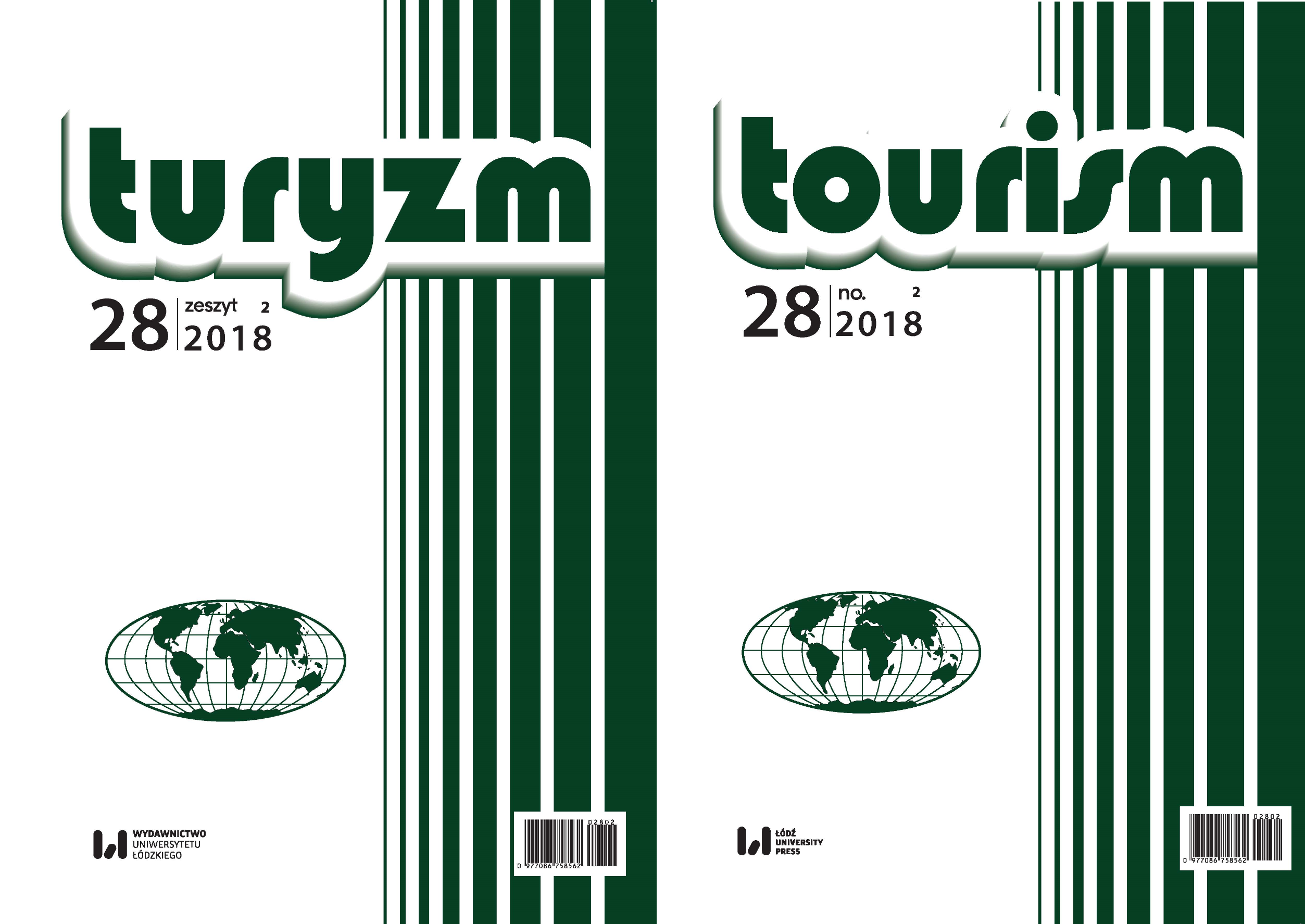Evaluation of the most popular accommodation booking portals with regard to consumer and academic usability
DOI:
https://doi.org/10.2478/tour-2018-0019Słowa kluczowe:
e-marketing, usability of booking portals, evaluationAbstrakt
The hospitality industry is classified as the most fundamental tourism service. As far as the dynamic development of the internet and its constantly growing number of its users are concerned, it seems natural for tourism managers and hoteliers to reach for this particular medium to present their offers and to sell them. Nowadays, the most significant issue for the entire hospitality industry is the broad scope of the global and international booking portals which are the contemporary distribution channels for tourism products and services worldwide. The aim of the following article is to assess the usability and functionality of four booking portals acclaimed on the Polish market (booking.com, hrs.com, hotels.com and hotel.info) with regard to the consumer’s (tourist’s) point of view and an evaluation of the suitability of this particular source of data for academic research through applying this method to hotels located in five Polish metropolises (Warsaw, Kraków, Łódź, Wrocław and Poznań).
Pobrania
Bibliografia
ANTONOWICZ W., 2018, Jak odpalić biznes hotelowy w Internecie – sześć kroków, [in:] ABC inwestycji hotelowych. Raport Magazynu Hotelarz, Polskie Wydawnictwa Specjalistyczne ProMedia, Warszawa, pp. 48-50.
Google Scholar
BAŃSKI J., 2006, Witryny internetowe jednostek samorządowych z siedzibą w małych miastach – analiza i ocena, Studia Obszarów Wiejskich, v. 11: Rola małych miast w rozwoju obszarów wiejskich, pp. 59-72.
Google Scholar
BŁASZCZUK W., WITKOWSKI C., 2006, Hotelarstwo w Polsce. Wybrane zagadnienia, Wyd. Akademickie WSSP im. Wincentego Pola w Lublinie, Lublin.
Google Scholar
BONICKA J., ANTONOWICZ W., 2018, Inteligentne, sprofilowane systemy przetwarzania danych, [in:] Economy & technology & marketing trends 2018, Wyd. Profitroom, Poznań, pp. 34-35.
Google Scholar
BRANNBACK M., 1997, Is the Internet changing the dominant logic of marketing?, European Management Journal, 15, 6, pp. 698-707.
Google Scholar
DROZDOWSKA M., DUDA-SEIFERT M., 2016, Travel websites: A relevant source of statistical information?, Turyzm/Tourism, 26, 2, pp. 7-13.
Google Scholar
ESCOBAR-RODRÍGUEZ T., CARVAJAL-TRUJILLO E., 2013, An eevaluation of Spanish hotel websites: Informational vs. Relational strategies, International Journal of Hospitality Management, 33, pp. 228-239.
Google Scholar
GUZIK R., 2006, Gminy w Internecie, [in:] B. Domański, W. Jarczewski (eds.), Klimat inwestycyjny w województwie małopolskim, Departament Gospodarki i Infrastruktury Urząd Marszałkowski Województwa Małopolskiego, Kraków, pp. 75-79.
Google Scholar
HYSKI M., BEDNARZAK J., 2012, Funkcje hotelarskie zabytkowych obiektów zamkowych, Wyd. Akademia Wychowania Fizycznego im. Jerzego Kukuczki w Katowicach, Katowice.
Google Scholar
KOTLER P., 2002, Marketing. Podręcznik europejski, Polskie Wydawnictwo Ekonomiczne, Warszawa.
Google Scholar
LAW R., 2009, Disintermediation of hotel reservations: The perception of different groups of online buyers in Hong Kong, International Journal of Contemporary Hospitality Management, 21, 6, pp. 766-772.
Google Scholar
MATCZAK A., 1986, Przyrodnicze podstawy organizacji wypoczynku w strefie podmiejskiej Łodzi, Acta Universitatis Lodziensis. Turyzm, 2, pp. 25-45.
Google Scholar
MARCUSSEN C.H., 2008, Trends in European internet distribution – of travel and tourism services. Trends in European internet distribution – of travel and tourism services, http://195.130.87.21:8080/dspace/handle/123456789/864?mode=full&submit_simple=Show+full+item+record; 17.10.2018.
Google Scholar
NOWAKOWSKI M., 2012, Użyteczność oficjalnych serwisów internetowych miast na turniej EURO 2012, Zeszyty Naukowe Uniwersytetu Szczecińskiego. Studia Informatica, 29, pp. 43-56, ISSN 0867-1753, ISSN 1640-6818.
Google Scholar
PIĄDŁOWSKI K., 2006, Portale internetowe, Centrum Edukacji Bibliotekarskiej, Informacyjnej i Dokumentacyjnej im. Heleny Radlińskiej w Warszawie, Warszawa.
Google Scholar
PRAŁAT E., 2011, Badania witryn internetowych polskich gmin, Zeszyty Naukowe Uniwersytetu Szczecińskiego, Ekonomiczne Problemy Usług, 67, pp. 564-571.
Google Scholar
PRZYBYLAK D., 2005, Znaczenie marketingu w usługach turystycznych, [in:] W. Siwiński, R.D. Tauber, E. Mucha-Szajek (eds.), Hotelarstwo, rekreacja, turystyka. Kierunki przemian w świecie postindustrialnym, Wyd. WSGiH w Poznaniu, Poznań, pp. 256-266.
Google Scholar
RUNGE J., 2006, Metody badań w geografii społeczno-ekonomicznej – elementy metodologii, wybrane narzędzia badawcze, Wydawnictwo Uniwersytetu Śląskiego, Katowice.
Google Scholar
SHELDON P.J., 1997, Tourism information technology, CAB International, Wallingfort.
Google Scholar
STANGL B., INVERSINI A., SCHEGG R., 2016, Hotels’ dependency on online intermediaries and their chosen distribution channel portfolios: Three country insights, International Journal of Hospitality Management, 52, pp. 87-96.
Google Scholar
Ustawa z dnia 29.08.1997 r. o usługach hotelarskich oraz usługach pilotów wycieczek i przewodników, DzU 2018, poz. 650.
Google Scholar
WERTHNER H., RICCI F., 2004, E-commerce and tourism, Communitation of the ACM, 47, 12, pp. 101-105.
Google Scholar
WERTHNER H., KLEIN S., 1999, Information technology and tourism, Springer Verlag Vien, Vien.
Google Scholar
WITKOWSKI Cz., 2007, Hotelarstwo, part 1: Podstawy hotelarstwa, Wyd. Almamer, Warszawa, pp. 261.
Google Scholar
WOJCIECHOWSKA J., 2003, Analiza i ocena zagospodarowania turystycznego, [in:] S. Liszewski (ed.), Możliwości i kierunki rozwoju turystyki w Dolinie Odry, Katedra Geografii Miast i Turyzmu UŁ, Łódzkie Towarzystwo Naukowe, Łódź, pp. 136-156.
Google Scholar
http://www.e-hotelarz.pl/mht/?p=29196.
Google Scholar
https://pl.hotels.com/.
Google Scholar
https://poradnikprzedsiebiorcy.pl/-marketing-internetowy0.
Google Scholar
https://www.booking.com/.
Google Scholar
https://www.e-hotelarz.pl/mht/?p=14002.
Google Scholar
Pobrania
Opublikowane
Jak cytować
Numer
Dział
Licencja

Utwór dostępny jest na licencji Creative Commons Uznanie autorstwa – Użycie niekomercyjne – Bez utworów zależnych 4.0 Międzynarodowe.










